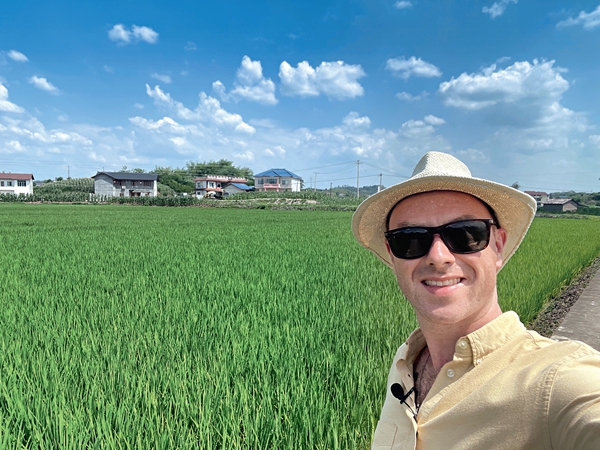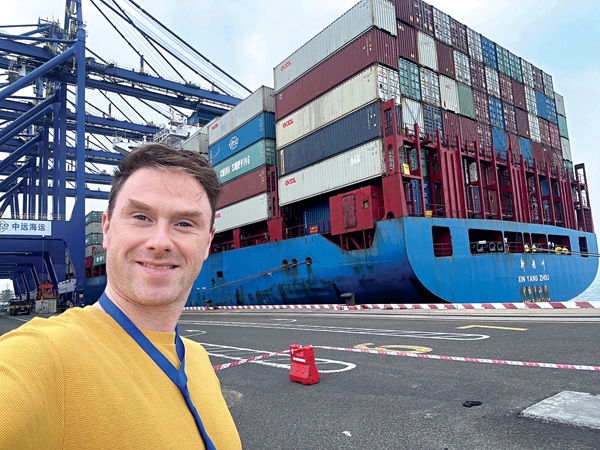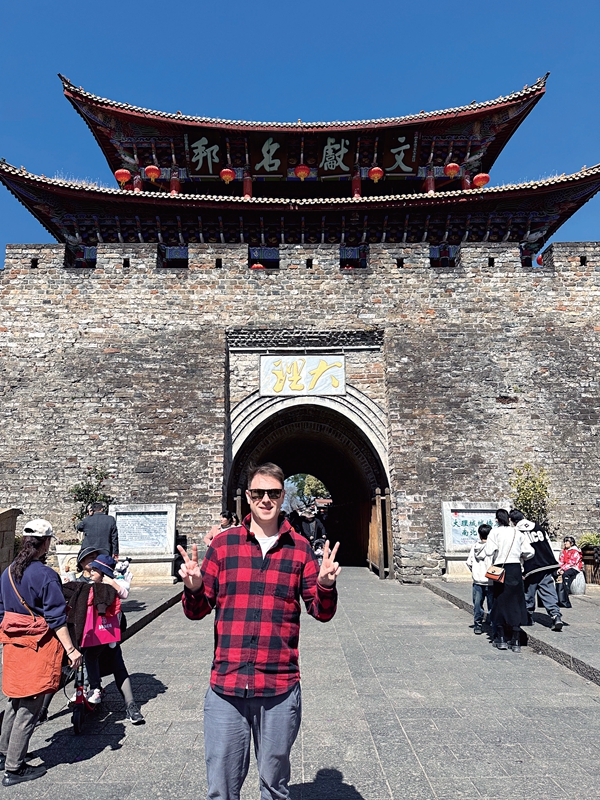My China Story | 'Vast, Interesting, and Fascinating'
Chengdu-Based Writer, Vlogger Enjoys Exploring China's Charms

From the British student, who arrived in China in 2008 as an exchange student, to the writer and vlogger, who settled down in Chengdu, capital of Southwest China's Sichuan Province, Toby Symonds has enjoyed every aspect of his life in China. He especially enjoys the fact he is able to continuously explore the country, which he says is "vast, interesting, and fascinating."
If you ask Symonds to list the cities, towns and villages he has visited in China, he will provide an exhaustive list, including metropolises like Beijing and Shanghai, places in East China's Shandong, Zhejiang and Jiangxi provinces, areas in South China's Guangdong and Hainan provinces, destinations in Southwest China's Yunnan and Guizhou provinces, places in Southeast China's Fujian Province, and stops in Northeast China's Heilongjiang Province. To Symonds, China is a vast and interesting country, one that requires years to explore.

Two Major Events
Symonds arrived in China in September 2008, when he was a third-year student, in the history department, at Newcastle University, the United Kingdom. He arrived at Sichuan University (in Sichuan Province) as an exchange student. At that time, he could barely speak Chinese, and he knew very little about the huge, Oriental country. Symonds quickly realized it was not so difficult to adapt to a new lifestyle, in large part because the people in Sichuan — in particular, the people in Chengdu, where he was living — were warm and friendly.

"Except for traveling around, my experiences in China have mainly been within Sichuan, and especially related to Chengdu. Looking back to the year I first arrived, in 2008, I happened to come after two major events that had affected China," Symonds recalls.
The first event was a natural disaster, the magnitude-8 earthquake that ravaged Wenchuan, and many other places in Sichuan, in May 2008. Symonds notes the disaster had a big impact on the people in the quake-stricken areas, and it caused them to think about life and death, and about the importance of seeking the utmost of their values during post-disaster recovery.
The other major event was considerably more positive; in August, the same year, Beijing hosted the 2008 Summer Olympics and Paralympics. Symonds says he believes the grand, international sports event affected all of China. "I was not in China during the Olympics. But when I arrived, one month after the big event kicked off, I could still feel the buzz. I felt the positivity passed via the Olympics. I think it marked one of the significant occasions, when Beijing, the Chinese capital, showed the world what a powerful, and capable, nation China was, that it succeeded in putting on, flawlessly, such a perfect grand sports event," Symonds says.
As a young student who relocated to Chengdu, Symonds said he was impressed by the positivity occurring in China, even though it was still coping with the devastating disaster from a few months earlier. By living in China, Symonds has gained a deeper understanding of Chinese people's determination to live promising lives.

Changes Everywhere
Since September 2021, Symonds has made and posted more than 300 short videos on his account, "Toby in China," on Douyin (one of the most popular short-video platforms in the country). In those videos, he shares interesting experiences during his daily life. He also highlights remarkable changes — in both urban and rural areas — across the country.
"When I first arrived in Chengdu, a lot of the local people rode bicycles across the city, for the flexibility of their travels every day. I sometimes saw 'bicycle traffic jams,' like a traffic jam normally occurring with vehicles. But now, given the improvement of the traffic system, especially because of the effective construction of metro lines, I no longer see bicycle traffic jams in 2024. There are people who still choose to ride bicycles, but they need not worry about being trapped on the way," Symonds says.

When Symonds was a student at Sichuan University, traveling toward Chengdu's Third Ring Road meant going a long distance outside of downtown for most of the locals. "After 15 years, or so, the capital (Chengdu) has definitely grown dramatically. I can't talk in terms of its population size, but, in terms of urban construction and expansion, the city has grown considerably. Meanwhile, the fast improvement of the metro system has made it quite normal, and convenient, nowadays to go beyond the Third Ring Road," Symonds says.
In addition to the changes that have occurred in urban areas, Symonds has been impressed by China's efforts to revitalize rural areas, which have included efforts to help rural residents start and operate businesses, particularly e-commerce, in the countryside.

"I once visited an e-commerce star in a village in Sichuan. He and his wife have two lovely kids. They primarily sell agricultural products, including fruits, vegetables and so on, grown on their family farm. In the past, local fruit and vegetable sellers, like the family I visited, could only sell their products to the places they were able to travel to, or to wherever they could find wholesalers to help them sell the products. So, they basically sold products within Sichuan Province. With the support of e-commerce development, in recent years, rural business owners in Sichuan have gone beyond the restriction of location; they have been able to sell their products to places all across China. Their customer base, by selling online, is certainly much bigger," Symonds explains.
During the latter half of last year, he visited Gaohuai, a village in Deyang, a city in Sichuan. Symonds says it is interesting how the village has been able to boost its tourism industry by developing its coffee industry. "Sichuan impresses me more as a province, where people tend to drink tea. I would say coffee is surely popular among people living in big cities, like Shanghai. But the villagers in Gaohuai indeed have attempted to create a sort of 'coffee town' to advance tourism in the countryside, and to improve the local economy," Symonds says.

Symonds has a hard time imagining Gaohuai was a poverty-stricken village in 2014. By developing a coffee-related industry, the village was able to shake off poverty within two years. Since 2016, the village has been shifting the focus of its tourism industry, from focusing solely on coffee to developing diverse cultural and creative products. Today, Gaohuai is not only one of China's beautiful and livable model villages, it is also a well-known tourist attraction in Sichuan.
As Symonds continues to post videos on "Toby in China," his exploration of this "fascinating country" will advance.
Photos from Interviewee
(Women of China English Monthly May 2024)
Editor: Wang Shasha
Please understand that womenofchina.cn,a non-profit, information-communication website, cannot reach every writer before using articles and images. For copyright issues, please contact us by emailing: website@womenofchina.cn. The articles published and opinions expressed on this website represent the opinions of writers and are not necessarily shared by womenofchina.cn.








.jpg)

 WeChat
WeChat Weibo
Weibo 京公网安备 11010102004314号
京公网安备 11010102004314号